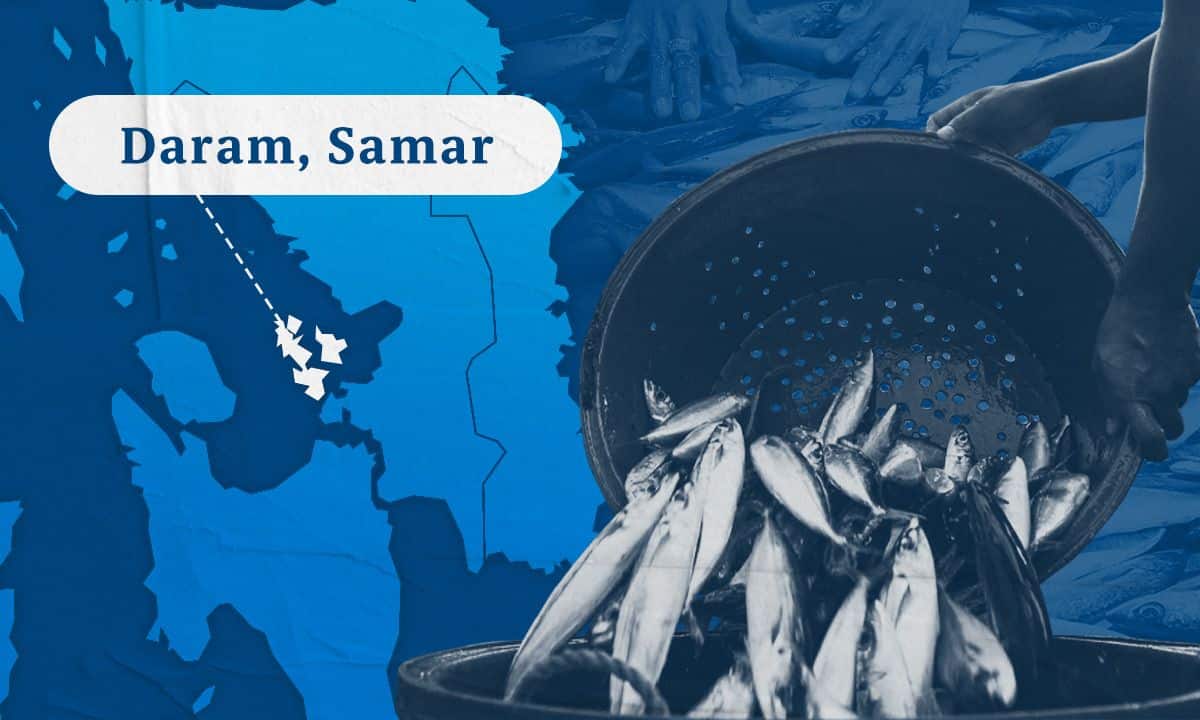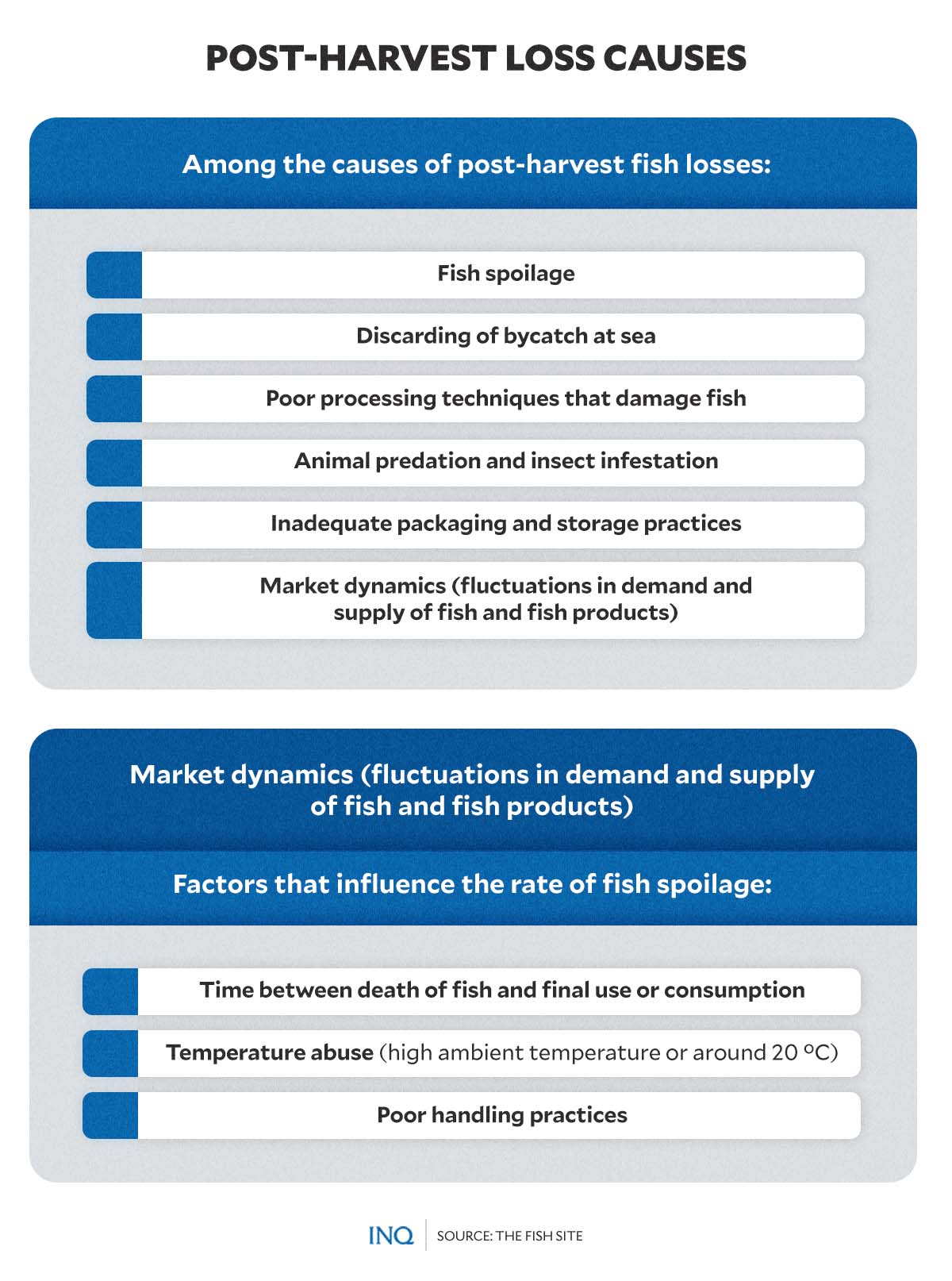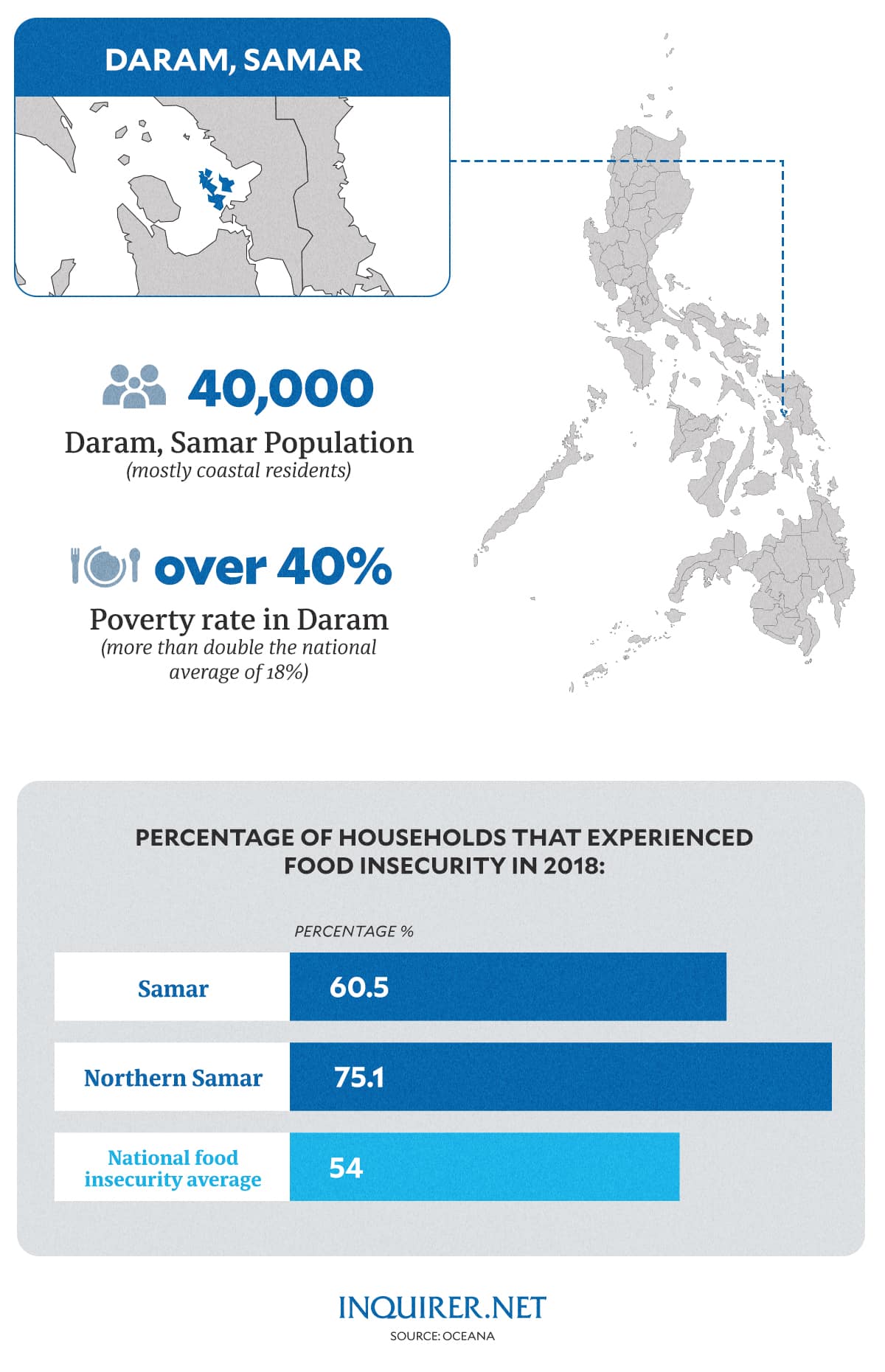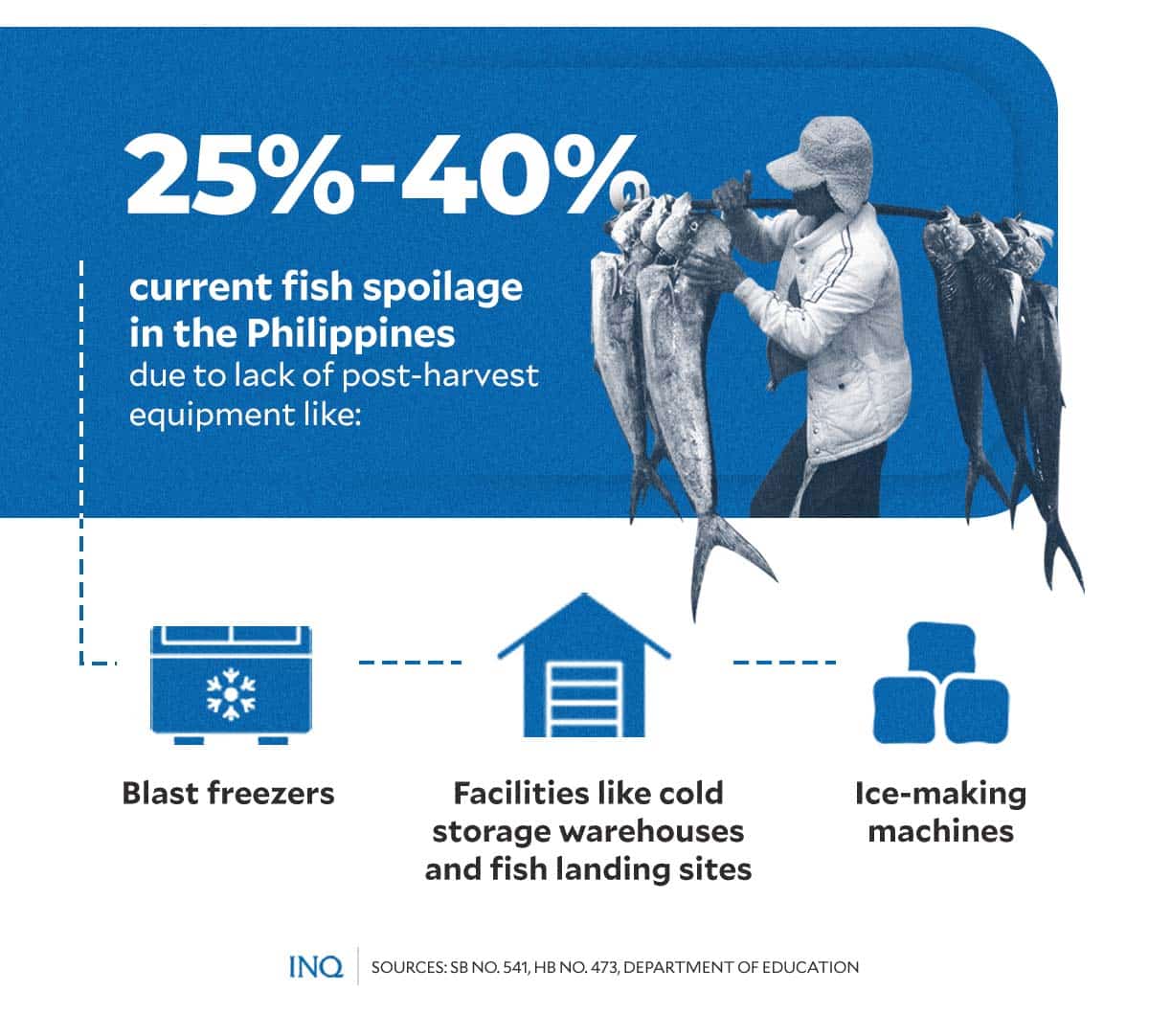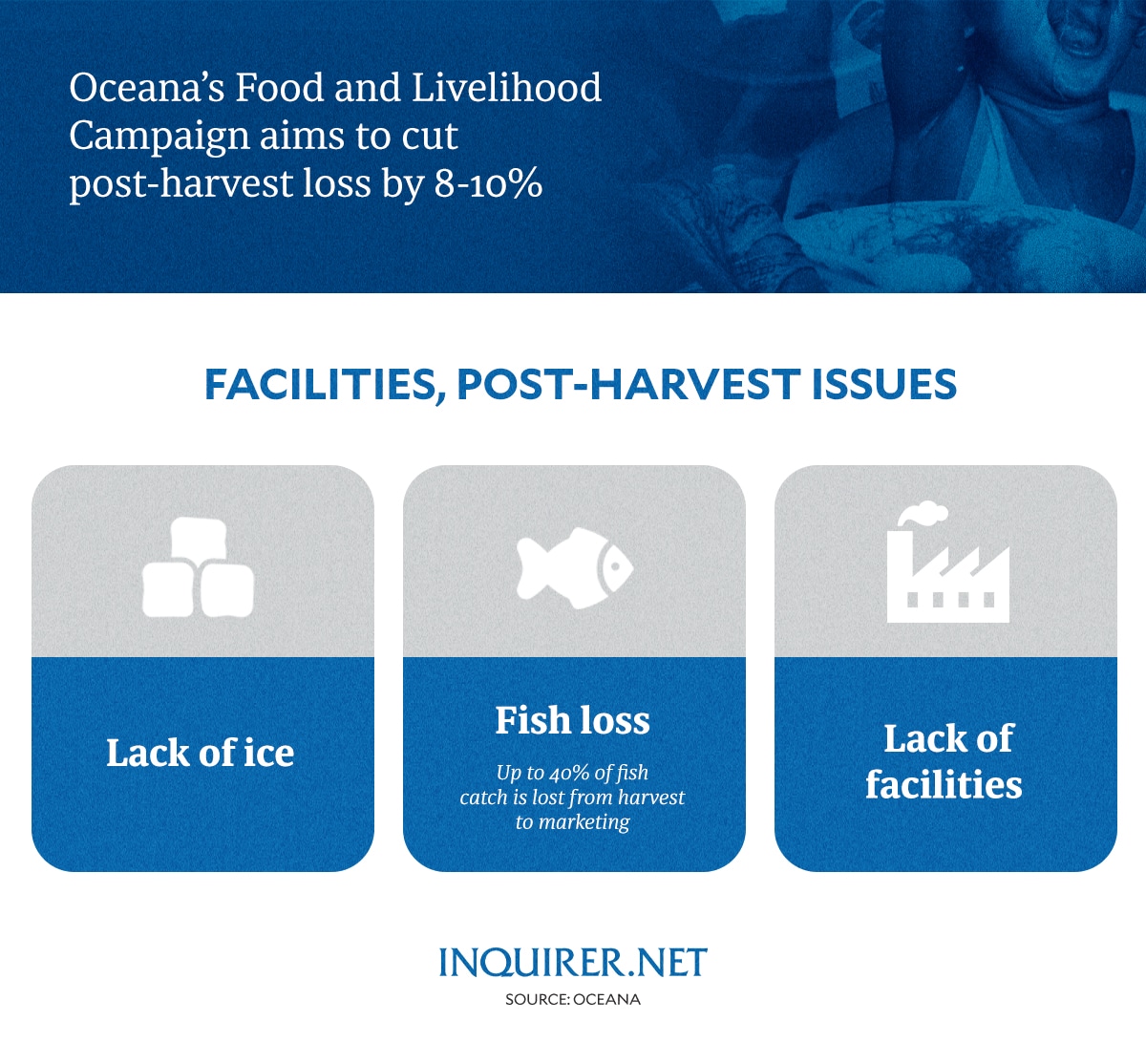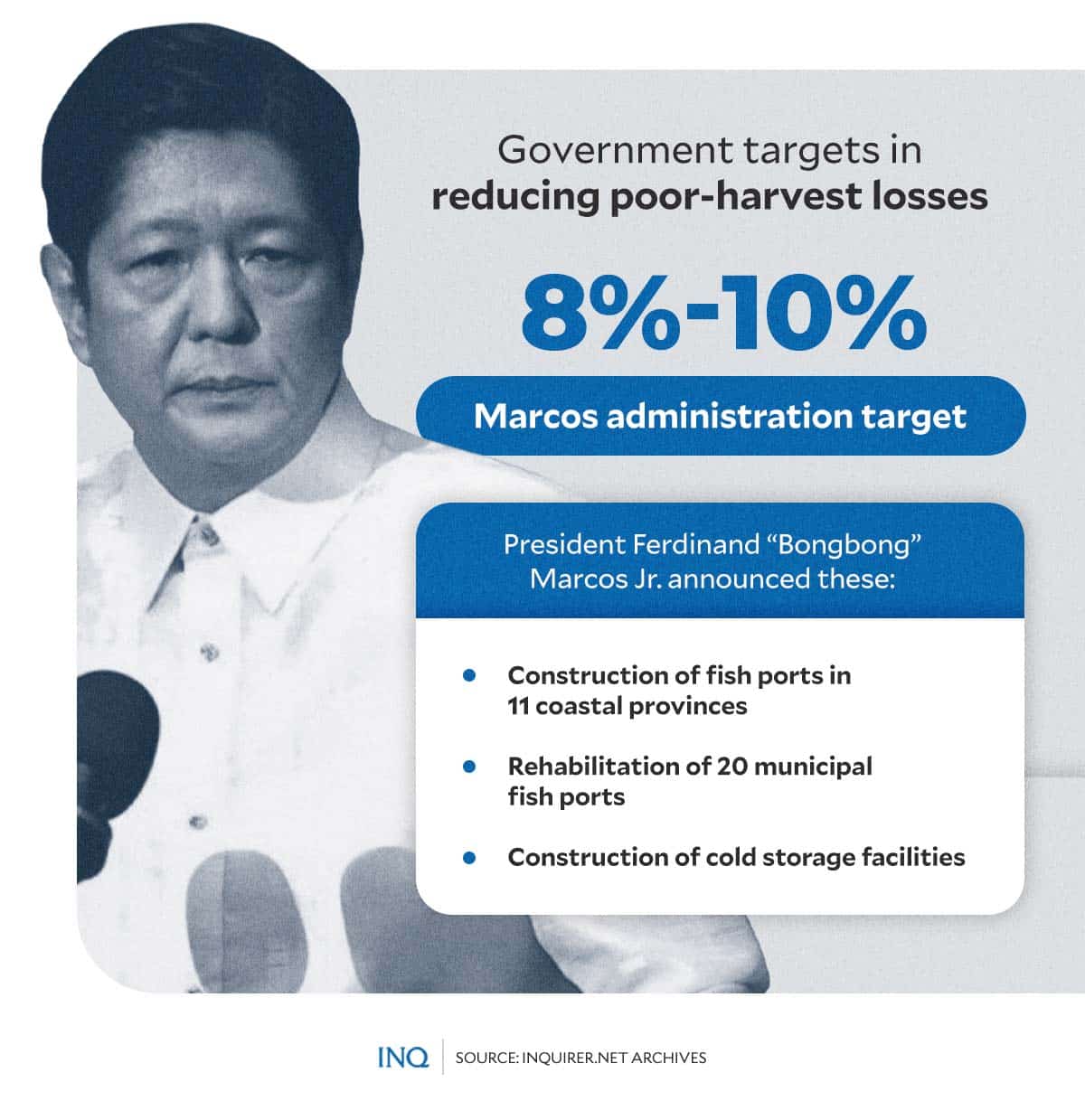Fish loss of 40 percent draws campaign from Oceana
MANILA, Philippines—In the coastal municipality of Daram, Samar, where most residents depend on fishing for their livelihood and daily sustenance, post-harvest fish loss remains a persistent issue. Here’s how a renowned marine conservation group is working to tackle the problem.
Post-harvest fish loss refers to the decline in quantity, quality, or market value of fish after it has been caught and before it reaches consumers.
This is particularly significant in the Philippines, where fish serves as a dietary staple and an essential source of micronutrients and animal protein.
READ: PH post-harvest fish losses need more than band-aid solutions, gov’t told
Various types of post-harvest fish losses include loss in nutritional value, physical loss, quality loss, economic loss, market force loss (caused by inadequacy between demand and supply leading to changes in the price of fish), losses due to traditional processing, losses during distribution and storage, and losses due to insect infestation.
Article continues after this advertisementPrevious studies noted that among the causes of post-harvest fish losses include fish spoilage, discarding of bycatch at sea, poor processing techniques that damage the fish, animal predation and insect infestation, inadequate packaging and storage practices, and market dynamics (fluctuations in demand and supply of fish and fish products).
Article continues after this advertisement“The catch of fisherfolk is almost entirely used for domestic consumption, so not only is that a loss of income for the fisher, but a loss of food for the community,” said Oceana, an international ocean protection and conservation group.
The group highlighted that this issue intensifies the fishing sector’s challenges in meeting growing demand driven by population growth, as climate change and unsustainable practices further exacerbate overfishing and the depletion of fish stocks.
A study by Oceana found that post-harvest fish losses are prevalent in coastal communities along the Samar Sea, particularly in Northern Samar and Samar province, including Daram.
“Initial estimates put average post-harvest losses in the target areas (representative communities in the two provinces) at 40 percent — that is, 40 percent of the catch by volume is subject to physical and quality loss. These locales are also at the top of the list of areas in the Philippines with malnutrition and high poverty incidence,” the study stressed.
These losses significantly affect food security and the economic stability of local communities that rely heavily on fishing for their livelihoods.
Post-harvest fish losses in Samar, Northern Samar
In 2018, a significant portion of households in Samar (60.5 percent) and Northern Samar (75.1 percent) faced food insecurity—well above the national average of 54 percent.
The National Nutrition Council attributes high rates of stunting, wasting, and iodine deficiency in these provinces to inadequate protein and fish consumption.
Given the high poverty levels and widespread food insecurity, maximizing the efficient use of fish catches is crucial. However, the species most affected by post-harvest losses — sardines, anchovy, and slipmouth — are staple foods for low-income households.
READ: When those who feed the nation are the poorest: Farmers, fisherfolk in deepest poverty pit
Oceana’s study revealed that fish quality loss is the most common issue in select municipalities in Northern Samar and Samar provinces, primarily caused by poor handling and inadequate storage, leading to spoilage and lower market prices.
This problem is particularly severe in Daram, where over 40,000 coastal residents rely heavily on fishing for their livelihood.
With a poverty rate exceeding 40 percent — more than twice the national average of 18 percent — Daram, which has the largest municipal waters in the Samar Sea, faces significant challenges in maintaining fish quality and maximizing income from their catch.
“One of our problems in Daram is that the majority of our fish catch [is] not brought here. The fishers sell these in the city. We don’t have facilities, and we lack processing,” said Daram Mayor Philip Astorga in Filipino.
“Ice is hard to come by here. Once we have ice, we’re sure that our fishermen will come here, and the fish catch in Daram will also increase,” he added.
Data from the Bureau of Fisheries and Aquatic Resources (BFAR) revealed that the country’s fish spoilage ranges between 25 to 40 percent due to a lack of post-harvest equipment — including blast freezers, ice-making machines, and facilities such as cold storage warehouses and fish landing sites.
Meanwhile, Oceana’s study highlighted that physical loss, where products are completely discarded due to factors such as adverse weather or harmful algal blooms, was also particularly impacting aquaculture.
Additionally, market force losses, which occur when fish are sold at prices lower than optimal, were also profound, especially in regions with intricate supply chains where fish pass through multiple traders before reaching consumers.
“The estimated post-harvest fish losses were significant, at 38.39 percent in municipalities along San Bernardino Strait, and 40.34 percent in those along Samar Bays and channels,” the ocean conservation group said.
Food and livelihood campaign
Oceana emphasized that implementing science-based and participatory Fisheries Management Areas (FMAs), alongside fully enforcing the National Management Plan for sardines and vessel monitoring requirements for all commercial fishing vessels, can effectively combat illegal fishing in municipal waters.
These measures will empower fisherfolk, alleviate poverty, and ensure food security for families, all without requiring any additional fish to be caught from the sea.
“Well-designed interventions are needed to reduce fish waste for small-scale fishers, who are often on the water for long stretches of time, in small boats that lack shade, without ice to preserve catch, and far from well-equipped landing sites with access to refrigeration or other methods of preservation,” said Gloria Estenzo Ramos, vice president of Oceana in the Philippines.
“We are committed to working hand-in-hand with artisanal fisherfolk, the local governments, national agencies, academe and other allies to ensure that our oceans are sustainable and resilient as we face the impacts of climate change,” Ramos continued.
On the other hand, Astorga lauded Oceana’s Food and Livelihood Campaign, which aims to reduce post-harvest fish loss and enhance the livelihoods of fisherfolk. He noted that this initiative is a significant support for their community.
“Eventually, when we have post-harvest facilities and fish processing, I’m sure our problem with malnutrition will decrease since quality fish will be available to us. It won’t just be the smaller fish left for us,” the Daram mayor said.
Oceana launched its campaign in Daram, Samar, last week. The event coincided with the Farmers and Fisherfolk Congress, which focused on important topics in local fisheries, specifically the post-harvest procedures and losses, and measures to alleviate poverty and support sustainable livelihoods for coastal communities dependent on marine resources for sustenance and income.
Arnel Real, president of the Municipal Fisheries and Aquatic Resources Management Council (MFARC), who also attended the event, said the campaign will be “a significant support” for fisherfolk like himself.
“It is important for the policies to be implemented effectively for our future here in Daram. It will help alleviate poverty,” Real said.
Ramos stated that the Food and Livelihood Campaign aligns with the national administration’s goal of reducing post-harvest loss by 8 to 10 percent. She emphasized that this initiative is crucial for enhancing the local economy and ensuring the food and nutritional needs of thousands of families in Samar who depend on fishing.
“It is alarming that almost half of fish catch is lost before they are landed or rots before they are sold — when we address this, imagine how much of a positive difference this will make for coastal communities and the lives of their children,” Ramos said.
“We see this campaign as a full-circle moment — for [ten] years that we have been campaigning for science-based fishery management laws and policies to protect our oceans — we’re now helping ensure strong post-harvest measures and support interventions for the livelihoods and well-being [of] our fisherfolk,” she added.
Reduction of post-harvest fish loss
During the campaign launch, lawyer Rhea Yray-Frossard, director of Oceana’s campaign research department, presented a study outlining key actions to reduce post-harvest fish loss. These recommendations include:
- Establish robust fish catch monitoring and reporting systems, ensuring accurate data on fish catch.
- Train women and mobile peddlers in post-harvest handling and processing to minimize quality loss.
- Limit catch volumes of species with high post-harvest fish loss during peak fishing seasons to reduce physical and market force loss.
- Establish an organized marketing system to connect fishers and aquafarmers with buyers, enhancing market linkages in the fish distribution chain.
- Implement area- and species-specific price regulating mechanisms to control fish prices and ensure fair profits for fishers and aquafarmers.
- Develop off-site or on-site cold storage and processing facilities for a year-round supply of fresh products and to reduce post-harvest fish losses.
- Refurbish non-operational Community Fish Landing Centers (CFLCs) into multi-purpose facilities for storage, processing, and tourism.
Ramos explained that as Oceana strengthens its partnership with local governments in Daram and Samar, the focus remains on sustainable fisheries management and the protection of the marine environment.
This commitment, she said, aims to ensure food and nutrition security while enhancing fisherfolk incomes and improving livelihoods.
“With science-based management and by cutting on post-harvest losses, the collaboration should enhance both community wellbeing and the long-term sustainability of local fisheries without having to catch more fish in the sea,” said Oceana Philippines’ vice president.
“Through capacity building and policy advocacy, Oceana works with the Daram and Samar local governments, artisanal fishers, and scientists to safeguard ecosystems and support responsible fishing practices,” she added.
In its study, Oceana also stressed the need for better integration of fisheries management into broader nutritional and food security programs.
RELATED STORIES:
Marcos orders setting up of cold storage facilities at fish ports
PH fishers’ cry: Freedom to fish in our country’s waters, not ‘ayuda’
